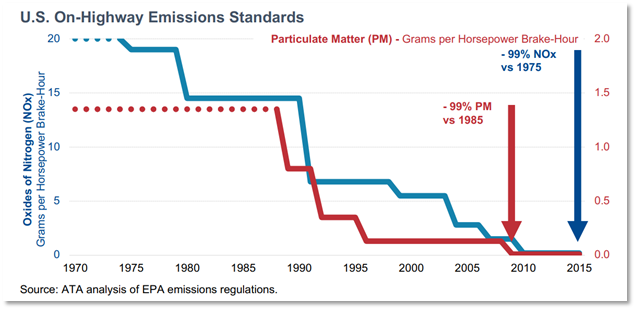By repealing a century-old excise tax on heavy-duty vehicles, we can drastically slash supply-chain emissions right now.
The trucking industry has made massive strides in reducing tailpipe emissions over the past 35 years thanks to innovation and achievable regulatory targets and timelines:
✅We’ve cut harmful NOx and particulate matter emissions by 99%.
✅We’ve eliminated virtually all sulfur-dioxide emissions.
✅Between 2014 and 2027, we stand to cut 1.37 billion metric tons of CO2.
The problem? Not nearly enough of these newer and cleaner trucks are on the road today because of a century-old federal excise tax (FET) on heavy-duty trucks that penalizes trucking companies for upgrading their equipment.

By the numbers: 47% of the trucks in our nation’s fleet are pre-2010 models. In California, 53% of trucks are pre-2010.
Why it matters: 2010 marked a major milestone in truck engine technology with the standardization of selective catalytic reduction and diesel particulate filters. A truck sold in 2006 emits roughly 10 times the amount of NOx and particulate matter as a truck sold today.
💡Solution: By removing the FET that disincentives the purchase of today’s clean trucks, Congress can dramatically accelerate the turnover of our nation’s truck fleet and take a big bite out of freight emissions and our nation’s carbon footprint. At 12%, the FET is the steepest excise tax on any good across the entire economy today.
📈 The FET adds approximately $20,400 to the price tag of a $170,000 new-generation, clean-diesel tractor.
📈For a $425,000 zero-emission battery-electric tractor – which is already a cost-prohibitive price point for most fleets – the FET tacks on an extra $51,000 in cost.
It's no wonder then that a fleet owner opts to hold onto older equipment longer. Even if carriers want to replace their existing fleet with today's clean trucks, most simply can't afford to at that rate – especially when factoring the inflationary pressures of the last few years. Remember that 96% of U.S. trucking companies are small businesses operating 10 trucks or fewer.
Many emerging technologies hold promise, including and certainly not limited to battery-electric trucks. But before widespread battery-electric adoption is physically possible, there are enormous infrastructure, product sourcing and power generation requirements that must first be met.
ATA First Vice Chairman Andrew Boyle, Co-President of Boyle Transportation, testifying before the Senate Environment and Public Works Committee
As those challenges are met in time, Congress can immediately advance a solution via the Modern, Clean and Safe Trucks Act (H.R. 1440 and S. 694). This bipartisan legislation before Congress would unlock environmental gains made possible by existing technology already available today while helping cost parity concerns associated with costlier zero-emission trucks.
The FET tax on heavy-duty vehicles was first implemented more than a century ago to help pay for our military spending during World War I. Repealing this relic would accelerate the turnover of our nation’s aging truck fleet, putting not only cleaner trucks on the road, but safer vehicles as well. Today’s trucks come equipped with lifesaving features including:
➕ Automatic emergency braking,
➕ Collision mitigation,
➕ Blind spot warning,
➕ Lane-keeping assist,
➕ Traction control, and more.
As another national election cycle rolls around, Americans are once again wondering if Washington can apply common-sense solutions to complex challenges. When it comes to climate, Congress should think differently, think possible, and think now.
🧠We can radically cut emissions right now. Repeal the century-old federal excise tax on heavy-duty vehicles. Let’s get today’s cleaner and safer trucks off factory floors and dealer lots and actually onto America's highways.
ATA President and CEO Chris Spear testifying before the Senate and Environment Public Works Committee